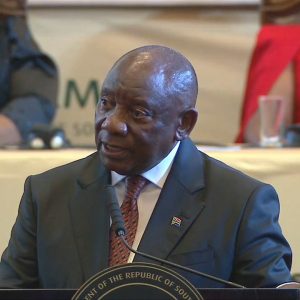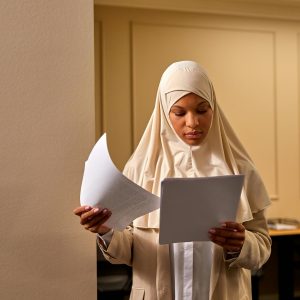South Africa urges world court to order Israeli withdrawal from Rafah
Lawyer Adila Hassim detailed genocidal conduct, saying since the last hearing by the ICJ in January, Israel has killed 11,500 people, with most of them children
Muslim Network TV Desk
THE HAGUE, Netherlands – South Africa concluded its arguments before the International Court of Justice (ICJ), requesting additional emergency measures to address Israel’s ongoing offensive in Rafah, Gaza.
Over the first day of two days hearings, South Africa sought immediate action to protect the more than one million displaced Palestinians who have taken refuge in Rafah. Israel will present its defense on Friday.
South African Ambassador Vusi Madonsela delivered in his final remarks, emphasized the urgency of the situation. He outlined three key provisional measures for the ICJ to order:
Immediate cessation of Israeli military operations in Gaza, including Rafah, and withdrawal from the Rafah crossing.
Unrestricted access for UN officials and humanitarian aid organizations into Gaza, as well as access for fact-finding missions, investigators, and journalists.
Regular reports to the ICJ on the implementation of these measures.
This request marks the fourth instance South Africa has sought provisional measures from the ICJ regarding the Gaza conflict. Previous orders were issued in January and March, but South Africa claims Israel has ignored these directives and escalated its military actions in Rafah.
Lawyer Adila Hassim detailed what South Africa describes as genocidal conduct by Israel. In an emotionally charged statement, she said since the last hearing by the ICJ in January, Israel has killed 11,500 people, with most of them children.
She said humanitarian catastrophe has been created by the blockade, and the systematic targeting of medical facilities. Hassim also referenced mass graves discovered in Gaza, providing evidence of Israeli massacres.
Egypt, Turkey, Nicaragua, and Colombia have formally joined South Africa’s case, urging Israel to comply with its obligations as an occupying power and ensure humanitarian access to Gaza. The case is part of a broader ongoing effort by South Africa, which accuses Israel of acts of genocide against Palestinians.
The ICJ and the International Criminal Court (ICC) play distinct roles in international law. While the ICC prosecutes individuals for war crimes and genocide, the ICJ resolves conflicts between states. The ICC is currently investigating Israel’s actions in the occupied West Bank and Gaza Strip.
South Africa’s application highlighted the dire conditions in Rafah, describing it as the “last refuge” for Palestinians in Gaza. The ICJ previously found that Israel must prevent acts of genocide under the Genocide Convention.
However, South Africa asserts that Israel has not only failed to comply but has intensified its military operations, exacerbating the humanitarian crisis.
During the hearings, South Africa’s representatives emphasized the severity of the situation. Professor Vaughan Lowe argued that Israel’s actions in Rafah are part of a broader strategy to destroy Gaza and its Palestinian population. He refuted Israel’s claims of self-defense, stating that self-defense does not justify genocide and that the prohibition on genocide is absolute.
Professor John Dugard addressed the court’s jurisdiction, reaffirming that the ICJ has the authority to rule on the case. He highlighted the worsening humanitarian conditions in Gaza, citing Israel’s intensified attacks and the blockade of essential supplies.
He reminded the court that in January it found that the “catastrophic humanitarian situation in the Gaza Strip” was at serious risk of deteriorating further before the court could render its final judgement and warranted provisional measures.
In March, he continued, “The court found that the catastrophic living conditions of the Palestinians in the Gaza Strip have deteriorated further, in particular, in view of a prolonged and widespread deprivation of food and other basic necessities.”
Tembeka Ngcukaitob argued that Israel’s military operations in Rafah indicate genocidal intent, asserting that Israel’s leaders are aware of the consequences of their actions. He called Rafah the “last stand” for Palestinian life in Gaza, emphasizing the need for immediate intervention.
Irish lawyer Blinne Ni Ghralaigh, speaking for South Africa, urged the ICJ to modify its provisional measures explicitly to order Israel to cease military operations in Rafah and withdraw from Gaza. She stressed the need for the court to create conditions for its measures to take full effect, given Israel’s continued defiance.
Professor Max du Plessis presented new facts and the grave changes in the situation in Rafah that is fast leading to the deadliest phase of this ongoing genocide.
He said continuing Israeli attacks on Rafah, the area it previously ordered civilians to evacuate to, clearly indicate “genocidal intent”.
The fact that Israel pushed more than one million Palestinians into Rafah and then carried out a “full-scale bombardment” of the province, all while sealing it off from aid and exposing it to famine, he said, is evidence of this intent.
This shows that Israel’s use of evacuation zones are “purely performative”, only further “endangering” Palestinian life, du Plessis added.
“Rafah as a place of refuge or place of safety remains a cruel distortion.”
The ICJ, established in 1945, resolves disputes between states and ensures compliance with international treaties, including the Genocide Convention. Both South Africa and Israel are signatories to the convention, granting the ICJ jurisdiction over this case. The convention obliges signatories to prevent and punish acts of genocide.
As the hearings concluded, South Africa reiterated its call for urgent action to protect the Palestinian population in Rafah and prevent further escalation of the humanitarian crisis. The ICJ’s decision on the requested provisional measures is awaited with anticipation, as it could significantly impact the situation in Gaza.










